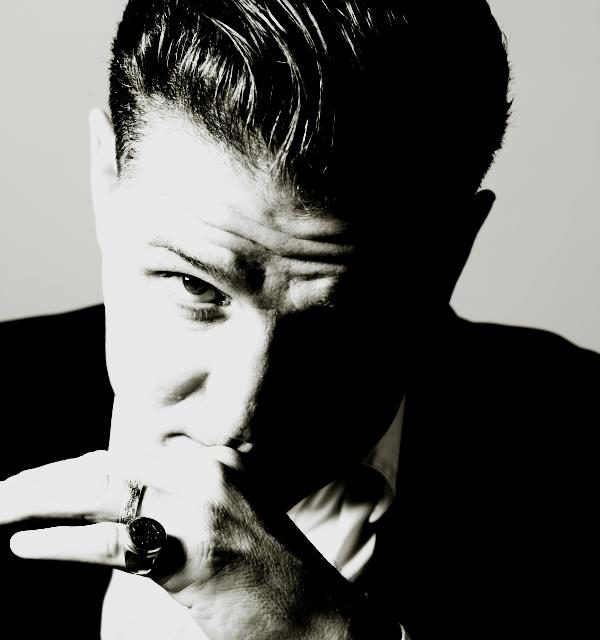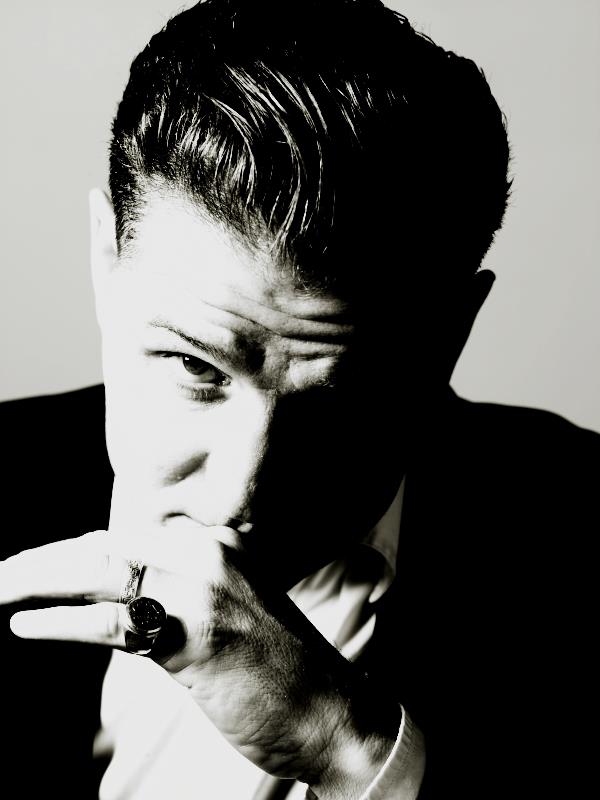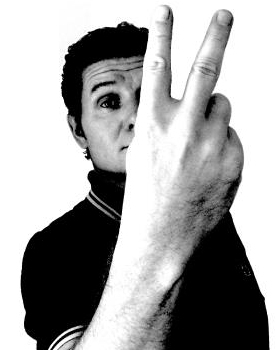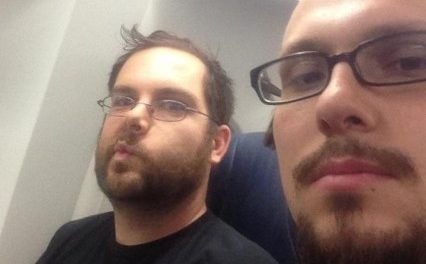“Somehow the black keys are the ones you just go to. The saddest of all keys…”
Douglas McCarthy is the iconic voice of EBM, an artist whose work with Nitzer Ebb extends well beyond the boundaries of Our Thing and into the reaches of the greater sphere of electronics: his influence attested to by guest spots and collaborations with artists as varied as Recoil, Motor, Terence Fixmer and Kloq, his alternately suave, sinister and frank delivery instantly recognizable to anyone who has spent any amount of time exploring the darker corners of electronic music. His fantastic solo LP Kill Your Friends found Douglas expanding even further into new areas of sound, all with a welcome sense of melancholy and emotion that instantly made it one of our favourites of 2012. With the album now reaching wide release in 2013 he found time to chat with us about how the record came to be, life in Los Angeles and being part of the greater history of synthesized music.
I Die: You Die: You’ve had a pretty lengthy and storied career both with Nitzer and in collaborations with other artists, namely Terence Fixmer. What made you decide to do not just a non-Nitzer record, but specifically a solo record now?
Douglas J McCarthy: I decided on the idea when we were on the lengthy and staggered Industrial Complex tour. Partly because the tour was so long. I lost count but it was somewhere north of 175 shows over the course of the best part of two years, and we had periods of time where there would be months off in between these legs of the tour. I ended up living some of the time in London, some of the time Los Angeles, some of the time in Berlin and towards the very end I was back in the UK looking after my dad who was sick. Having been through the process of making a Nitzer Ebb record, which was very positive and very productive actually – we ended up having 30-something songs which we pared down to the 12 on the record – there were a lot of ideas, some of which were tangents, but all pretty much in the same vein, recognizably Nitzer Ebb.
I felt that as enjoyable as that was, I was missing something I get from working with Terence on the Fixmer/McCarthy stuff. It’s obviously more club oriented, but even then it’s stifled by the fact that it needs to fit into a techno remit. What I wanted to do was definitely concentrate on a club sounding album, but incorporate a much more “up” center, and the sounds I like that I’ve never played with Nitzer or Terence. Terence has gotten closer with stuff we’ve done, but I wanted to incorporate 80s b-boy influences and much more synthesized pop, rather than synth-pop of the style when I was younger. It’s almost like the memory of how I think those tracks sounded rather than actually listening to them.
ID:UD: That dovetails with what we thought was a globe-trotting feel to the album. We were hearing a lot of global styles, some dub, psych-rock and balaeric sounds. Even in the lyrics [to “Hey”] where you sing “London to LA/Berlin and Mexico City”, we were getting the impression that you were in those places when those songs were written.
DJM: Absolutely. There was a point in my lyrical career where, probably around Showtime where I decided it was more interesting to me to say fairly blatantly personal things, but unless you knew me you wouldn’t know they were personal. It’s that kind of feel I pursued with this album. There’s particular commentary particular people and events, but unless you know them, and even if you did, you maybe wouldn’t connect them. I find that’s a good source of inspiration. You’re essentially talking in an autobiographical way.
ID:UD: We read in the interview that you did with our friends at Coma that you wanted to make Kill Your Friends a dark dance record, but thematically we were picking up a fair bit of an uplifting, affirmative outlook, lyrically and sonically on a lot of the songs. Was that a conscious decision, did you have a thematic idea for the sound of the record before you started recording these tracks?
DJM: Yeah, well, major keys are always a bit of an issue with Nitzer Ebb *laughter*. It sounds ridiculous but somehow the black keys are the ones you just go to. The saddest of all keys. *laughter* I definitely didn’t want to shy away from stuff that would have something uplifting, and what’s interesting to me is that including that in the topography of the album, you get two challenges. Firstly, to make it still sound legitimate as me, and serious. But also it gives you a kind of freedom, you can get away with more morose and more emo sounding lyrics. There’s a point on Industrial Complex, “Going Away”, the ballad on that, my son who is in his early twenties now loved the fact that the end of the track, the most uplifting musical part of it was also the most terrific downer lyrically. Even just the sound of it, it’s reminiscent to me of pop music of an older age.
“You get to the end of the song, and all you’ve been thinking about is ‘Wow, I need to do some laundry…'”
ID:UD: It was interesting going back to Industrial Complex and listening to Kill Your Friends one after the other. Especially with “Death is King” kicking off the new album which is upbeat and bouncy, but is lyrically quite dark, especially coming off the back of the Nitzer album. How do those two records relate to one another? Are they intertwined and related?
DJM: The honest answer is no from my point of view, but there could be a subconscious link between the two. Obviously with me being the singer on both and lyricist there’s gotta be. My immediate thought is that specifically because I was already done with the creative process of Industrial Complex and was touring it – and I don’t mean this in a derogatory way, but it’s the best way to explain it – by the time you’re touring, it’s your day job. It’s not that it’s mindless, there’s all sorts of aspects of performing a record that are different from writing one, there’s a regime and an attention to detail when you’re performing a record live that is nothing to do with creating music. It’s you trying to replicate all the time.
Bon and I over the years have always tried to make sure that there’s a show being put on. Even that showmanship, although it’s heartfelt it’s still…you know, it’s rehearsed and tried and tested. You may tweak it here and there but essentially it’s something you’ve set out. You get to a point, and you may have heard it from other performers, where you start a song and you get to halfway through, sometimes the end of the song, and all you’ve been thinking about is “Wow, I need to do some laundry, I should call my mum, oh, it’s my sister’s birthday tomorrow”. Most of the time that happens because you’ve done it on auto-pilot and completely correctly. The point is that it’s essentially a day job. When you’re off stage you’re so exhausted you’re sleeping, or you can’t sleep and are thinking about new ideas, and that’s kind of the nucleus of Kill Your Friends.
ID:UD: So it’s a creative muscle or impulse that isn’t getting kicked or stimulated on the road unless you nourish it?
DJM: Exactly that, yeah.
ID:UD: We’re interested in how the collaboration with Mark Bell came about.
DJM: There’s an interesting thing, there are two Mark Bells.
ID:UD: It’s been confusing for us.
DJM: There’s LFO Mark Bell, then there’s Mark Bell who I worked with who is also an electronic music producer, also from the northwest of England. Mark Bell from West Yorkshire and Mark Bell from Lancashire, they’re actually neighbouring counties. I think they’ve both got the same middle name and are about the same age. It’s ridiculous. My Mark Bell is another transplant from England. At the time I met him through mutual friends, he was, and continues to be, immersed in quite deep house, tech house, very dance oriented music. When I met him it was when we were still writing Industrial Complex and he was quite eager, big fan of the Ebb, quite eager to get involved. At the time I was like, “I don’t think it’s the right vibe.” We became friends nonetheless, and it didn’t instantly hit me, but after a while of me making the initial tracks, just the music, no lyrics or vocals or anything, and I realised Mark would be a perfect person to go to. He has a very club oriented background.
ID:UD: What did he bring to the table creatively?
DJM: A deep understanding of technique, house techniques, not just production but also the general feel. You might laugh, but the 4/4, Nitzer Ebb sound is very “unswingy”, and that was one of the things I wanted to do: make every track very groovy and swingy. So everything I brought to him was already in that vein. We’re of a similar age, so we’ve got similar memories of different stages of music. He understood without me having to explain anything the references, he knew immediately who I was referencing just from the sound of the music.
“You get into a different lexicon of culture where you’re just part of something, some collective history.”
ID:UD: Backing up a bit, obviously your work has been very influential both inside and outside of what you could term industrial and EBM. There are whole subgenres of music dedicated to replicating the Nitzer Ebb and classic D.A.F. type sounds, but you can also hear plenty of influence in techno and house. Is there a circular nature to that? Do you find that the stuff that you have maybe helped influence is now a source of influence and inspiration for you?
DJM: Definitely. One of the early rising stars (and complete star now) is Richie Hawtin – a fellow Canuck, well, transplant from England – we were signed to Mute and immediately [when hearing Plastikman] it was like, “fuck yeah”. I’d already met him when I was living in Detroit when he was just a kid playing music in dingy places. He’s had great success, but he’s also played with Nitzer Ebb material even to this day, it’s a big part of his set. Less flatteringly, the Swedish House Mafia [who popularized Nari & Malini’s “Atom”, which sampled “Let Your Body Learn”], there’s not a reciprocal influence there, but there are certain things that have just become markers whether you know who is performing “Join In The Chant” or what it’s called, you know what it is. “Control”, similarly, and “Let Your Body Learn”. It’s not necessarily the most lucrative place to be in the world, because people don’t necessarily pay you for what they’re taking, but you get into a different lexicon of culture where you’re just part of something, some collective history.
ID:UD: We were hoping to talk to you a little about LA. A bit of a prosaic question, we understand that you ran a couple of club nights, White Slave Trade was one of them, do you have anything like that going on right now?
DJM: White Slave Trade was my wife’s night which was originally an afterhours, very chaotic, good fun night that was in the heart of the ghetto next to downtown until people started getting shot which is the way of things when you’re in this environment. That was resurrected three years ago and that was something I was more involved in. We put it in a legit club which was just kind of boring. I played and we had a few other people play, and it went for a couple months and it was just kind of “ehh”, why do it?
ID:UD: Quick background question, how long have you been living in LA?
DJM: I moved back in 2006, but I’d moved out here in 92 and was here for about five years but was in other places, too. Over the course of my life I’ve lived in LA for about twelve years.
ID:UD: We’re curious about how it as a city influences your work. As people from a comparatively smaller city, a lot of the depictions of LA we get up here are this odd dichotomy between crushing poverty and complete extravagance, Hollywood glamour and police brutality horrors. Is that odd tension a source of inspiration at all?
DJM: I like to think I live in extravagant poverty. *laughter* When European friends of mine visit to do a show, primarily they’ll be in a hotel in Hollywood or Beverly Hills or Santa Monica. I have kids that live in Santa Monica so I go over there and see them, but we live in East LA, in a quite fittingly industrial area near the river, actually. I’m looking out at a factory, barbed wire fencing, and a cell phone antenna. Basically, there can be months where I haven’t even seen the ocean, or will only see it when I’m flying out of LAX. The part of LA which is the most boring is, as in most cities, the tourist district, anything westside is really not anything to do with our day to day lives here. Everyone we know lives on this side of town. John [Giovanazzi of Das Bunker] lives not far from us. Our friends are either downtown or in Echo Park/Silverlake which is kind of becoming equally annoying with hipster nonsense. As with living in any city, no matter how big it is, you live within the confines of your pastimes, your friends, your work as well. The places that we go to, a gallery, a live show or seeing someone DJ, they’re all close to where we live, so we never see the other side of it.
“It’s human nature that there’s gonna be an underbelly..It just so happens that LA is so huge that the underbelly is pretty grotesquely enormous.”
Obviously we know it exists, but we don’t even have a television, so we probably see even less than you of what happens in those other parts of LA. Unless I go to TMZ. I could be in London and Vancouver, I’m that removed from all that bullshit that is there. There is crushing poverty, we lived downtown for a number of years. You get surprisingly used to stepping over people who are essentially – it sounds dramatic – but dying a slow death in the street. They’re on your doorstep so you step over them and carry on with your day. It is part and parcel of any big city, I think. I know Vancouver has a big drug problem. Whatever size city, towns even, it’s human nature that there’s gonna be an underbelly to it. It just so happens that LA is so huge that the underbelly is pretty grotesquely enormous as well.
ID:UD: Is there an appeal to that for you?
DJM: Definitely. One of the things that we lament, as every person who has lived in a downtown, seedy industrialized area, as soon as it starts to become gentrified than everyone’s talking about “Remember when we used to go there and there was crack whores giving blowjobs and people taking a shit on your doorstep?” *laughter* Fun times in days of yore.
ID:UD: We’re curious if you’re following much LA music right now. There’s a couple of bands from the industrial tradition, White Car, Youth Code, //TENSE//; is there anything you’re checking out right now?
DJM: We’re friends with all those guys. Robert [of //TENSE//] just moved here, White Car moved back, Elon was living in Chicago for most of White Car but he’s back. We bump into each other and hang out. Do you know William Marshall, Octavius? Definitely check that out, it’s pretty awesome, it’s much more experimental electronic. Definitely dance influenced, but in a much more complicated and esoteric way.
ID:UD: How are you presenting the new material live? We’ve had the pleasure of seeing you play, with Nitzer at the first Kinetik, and Fixmer/McCarthy at the third one. We have a bit of an idea of the difference between those two shows. What does a solo Douglas McCarthy show look like?
DJM: There’s two other players with me, Cyrus Rex and Jeff Smith. Cyrus is a complete modular synth nerd by his own admission so there’s a small eurorack modular system that he plays. Almost suitcase style, which hearkens back to how D.A.F first went out with an EMS synth, but it’s more complicated. And then Jeff plays a couple of keyboards with a bunch of effects pedals. Our basic plan, we haven’t done it yet, but our plan is to dispense with a laptop on the stage so it’s all pure electronics. There’s a small machine, Elektron’s 8 track sequencer the Octotrack. We’re gonna use that for the nuts and bolts of the percussion and some of the bassline stuff. But the rest of it is gonna be played live by Jeff or being fucked with by Cyrus.
ID:UD: Is there a specific tour planned for Europe or North America?
DJM: We’re probably looking at a summer type tour. I’ve got some shows in Europe with Terence Fixmer for late June, early July, so leading up to that. For the Douglas J McCarthy stuff, the hope is to hit Europe in the fall.
ID:UD: This interview is taking place around the time Kill Your Friends is getting wide release, but we had the album on vinyl back in December. What was the reasoning behind spreading out the dates of release?
DJM: There’s been this great shift to digital release, with everyone saying “you’ve gotta put the digital release out first, then you come up later with the physical copies”, then people were saying “you’ve gotta release them at the same time”. No one really knows the answer, it’s all experimental. We wanted to release the vinyl before Christmas, so that was available at the end of November. Then, because of Christmas being this big block of nothingness with everyone being distracted, this was the first period of time that seemed sensible to do a digital release. Let everyone get the Christmas thing out of the way. Ideally we probably would’ve not waited so long, but the Christmas thing overtook us. The idea was always to release the digital after the physical. Once the tour is in place, there’ll be additional tracks which haven’t been released, similar with what Nitzer Ebb did with Industrial Complex where there’s a tour edition, different versions available for hardcore fans who want to buy different physical versions or if you just want to get the songs it’ll all be available to buy on iTunes. It’s a way of continuing the process because attention spans are pretty limited these days in terms of the Internet shortening them, so just to keep things alive. There’s no great mystery to it, it was just happenstance with Christmas in the way.
We’re running basically on no money. Pylon’s a small label, a very good label. Peter Black whose label it is is a massive music fan, very smart, has an incredible history of music, better than mine, half of the time even when we’re talking about my music. He’s an exceptionally kind and intelligent guy that wants to put out the music that he loves and wants the musicians, the artists to have the recognition he feels they deserve. He’s a great person to partner with. He’s coming up with ideas all the time. It was him who really pushed for the Basic Pain Procedure vinyl release, and he made that happen very quickly. He’s a good egg, as they say.
Kill Your Friends is now available via all major digital retailers, and on CD and vinyl via Pylon records.





![An Interview With [:SITD:]](https://www.idieyoudie.com/home/wp-content/uploads/2011/10/sitd-440x264.jpg)


Top notch interview, guys! Extremely informative.